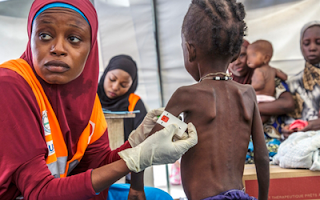Mogadishu's refugees 'waiting for death' as Covid-19 reaches Somalia
In the Nabadoon camp on the outskirts of Mogadishu, Asho Abdullahi Hassan, a 40-year-old mother of seven, has heard about the coronavirus on the radio.
 |
| A Somali girl rests at a camp near Mogadishu after fleeing the Lower Shabelle region. Photograph: Feisal Omar/Reuters |
I am very scared about this deadly virus. I only heard about it from the news. It is like we are waiting for death to come, she says.
The camp hosts about 3,000 families, most recently displaced from Somalia’s Lower Shabelle region following an intensification of fighting and US airstrikes.
Humanitarian activists are warning that it may be impossible to stop the spread of the virus in such places, where sanitary precautions are difficult and social distancing impossible.
In Nabadoon, few can afford soap and water is rare.
“This can get very bad. It will be hard,” said Patrick Youssef, deputy director for Africa at the International Committee of the Red Cross. “Our fear is that governments will seek to protect those they see as their own populations and people … in refugee camps will be left to fend for themselves.”
The spread of coronavirus in Africa has been much slower than in Europe and Asia, but the World Health Organization is concerned about a steep rise in cases across the continent in recent days.
The WHO’s Africa region – sub-Saharan countries plus Algeria – had recorded 990 confirmed cases and 23 deaths as of Tuesday morning.
Tedros Adhanom Ghebreyesus, director general of the WHO, has warned that official numbers may underestimate the scale of infection on the continent. “Probably we have undetected cases or unreported cases,” he said. “In other countries we have seen how the virus actually accelerates after a certain tipping point, so the best advice for Africa is to prepare for the worst and prepare today.”
South Africa, Senegal and Rwanda are the most recent countries to impose stringent new restrictions on movement. President Cyril Ramaphosa said police and army would enforce a three week lockdown from Friday.
But little attention has yet been paid to the 6.5 million refugees in sub-Saharan Africa, many living in precarious conditions, often already weakened by malnutrition and disease.
Health officials across Africa know that hospitals can deal with only a fraction of those needing care if the virus spreads through overcrowded cities, remote villages and among vulnerable populations such as those suffering from HIV and other chronic conditions.
Professor Pauline Byakika, a specialist in infectious diseases at Uganda’s Makere University, said prevention and control were key to fighting the virus in the crowded conditions of most refugee camps.
This is a highly infectious disease,” Byakika said. “They are crowded, they don’t have handwash facilities – they don’t even have hand sanitisers – [and] distance between one patient and the other is so close.
Jane Ruth Aceng, Uganda’s minister of health, said that any case of Covid-19 in refugee camps would be treated like outbreaks elsewhere.
“We have tents that we have procured, and [which are] ready to be set up to manage people who may get infected wherever,” she said. “For those who are severely ill, they will be referred and managed in the regional referral hospitals whose capacities are being built to handle Covid-19.”
The UNHCR, the UN refugee agency, has launched a campaign to educate refugees in Uganda about hygiene and sanitation, increase distributions of soap and hand sanitiser, and train health workers.
Experts believe some camps might be shielded to a degree by their distance from urban areas that are the usual entry points of the virus to countries. The age profile of many refugee settlements – with a very high proportion of young people and children – may also boost their resilience.
But a significant risk is that the focus on the threat of coronavirus will distract from other needs.
 |
| Students in Mogadishu wear face masks to protect them from the coronavirus. Photograph: Abdirazak Hussein Farah/AFP via Getty Images |
Ma’ow Ali Mohamud, a 56-year-old father of eight in a displacement camp in the Hodan area of Mogadishu, said his priority was food. “We only eat one meal every day. I am not bothered about coronavirus. We are lacking food. We do not have clean drinking water. That is my first priority,” he said.
A neighbour, Maryan Abdi Yarow, 70, said she and her family were without protection against the disease. “My children are malnourished. We do not have access to basic healthcare and now they are saying coronavirus has been confirmed in Somalia. If someone is infected then what can they do? Nothing at all.
“The government cannot even provide us clean water for drinking in this displacement camp. There are only six toilets for 1,000 families here. We are praying to God to help us.”






This comment has been removed by the author.
ReplyDeleteDr. Priya Tiwari is the best breast cancer doctor/specialist & oncologist in delhi, Gurugram and Gurgaon. She listen patient health issue very patiently.
ReplyDeleteBreast Cancer Doctor in Delhi || Breast Cancer Treatment in Delhi || Medical Oncologist in Delhi || Chemotherapy in Delhi || Stomach Cancer Doctor in Delhi